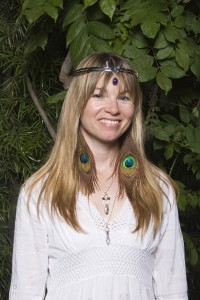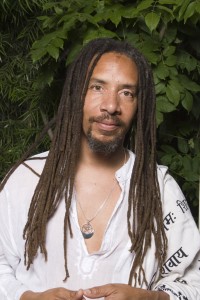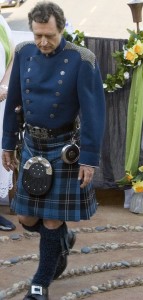“Destiny is the bright light beckoning us onward—our desires, talents, and ambitions guideposts along the way. The need to define what the light is, or the exact path to get there, would circumvent the adventure and limit the cosmic possibilities. Destiny is found in the eternal now by following Her Divine bread crumbs.”
—Rev. Xia, Priestess & Director
Temple of the Goddess, Los Angeles
The Journey by Rev. Xia
I suppose all adopted children go through much the same process, searching for answers, coming to terms with who they are, or who they thought they were. I don’t remember the first time I knew that I was different. For me, it was a slow awakening, a quiet knowing that I was somehow unlike those around me. I was sure I’d come from somewhere else. There was so much that was left unspoken, hidden truths whispered of the outside world. Things only hinted at on the breath of conversations. I felt denied what should have been mine. My despair increased in direct proportion to my longing for the other, the one who would reflect the truth of who I was.
I listened and watched, like an eaglet looking for the source of its nourishment. I gathered pieces of dropped dialogue, building a nest of knowledge. Over the years, that quiet knowing within me grew until it was a disturbing rumble that shook me out of complacency, causing me to declare once and for all this hidden knowledge I was holding in my heart. Like a petulant child, I demanded answers, and a right to search for the truth, my truth–the truth of my lineage. Isn’t that, after all, ultimately, what informs who we are, at least on some level?
I grew up believing myself to be a “daughter of Eve.” I thought this first mother, as she was depicted in the story of Creation, was my mother, my mythological mother. It was in Eve that my feminine roots were grounded. Her fall from grace became my responsibility. Her choice to taste the apple of knowledge and power were my blame. The lure of her sexuality, which caused a man to follow her into “sin,” were my burden to bear. Sin was all that was wrong in the world–all the hate, pain, anger, greed, and destruction.
The loss of paradise was the crime that I, and all my daughters for generations to come, would be accused of, and it was the fault of the first woman, my foremother, Eve. She couldn’t be trusted with power and knowledge, and ultimately, her sexuality was the instrument that brought all this sin down upon “mankind.” This I was told, was why man was placed above woman. This, was why women could not teach, preach, or be president. This was why women were to bear children in pain. All this debasing of women was punishment by God, the Father, because one woman wanted to be powerful, bright, wise, and sexual.
The story of Eve was told to me so often that I felt the weight of her burden as if it were my own. But to my young girl’s eyes, there was a huge discrepancy. What I saw around me were magnificent, wonderful, sensuous, loving women. Mothers who gave everything, including food from their own bodies, to care for their young. There was one who risked her life in a birth no one thought she could survive. This kind of love and sacrifice is the very nature of creation, and it was woman who did it, not man, the father. The women I knew, all these daughters of Eve, were strong, wise, loving, and not at all the stuff of the Genesis Creation.
All my life I had been spiritually connected, and I knew there was something out there–my roots–the something that I came from. Growing up, that connection manifested in different forms for me. I sensed Spirit in the voice of the leaves when wind joyously danced through them. I felt the Divine in the ocean waves that lapped against my lanky girl legs. I recognized the essence of Creation in a nursing mother suckling her babe in the church nursery. I experienced the powerful holiness of my blooming sexuality, and knew, in spite of the condemnation I heard, that it was good.
What I grew up with no longer sufficed. I wondered; Did it really matter by what name the Creator was called? It made sense to the teenager, the young woman I was becoming, that God could just as easily have been Mother as Father. Maybe it was only the interpretation of men some four thousand years ago that made God male. So at age eighteen I walked away from the teachings of my childhood. I denied my adoptive mother, Eve, and began the search for my spiritual and mythological roots, the journey to find my source.
The following years, decades, were spent exploring every denomination, mainstream church and obscure spiritual meeting I came across. I read everything from Thomas Merton to Edgar Cayce, but all the while my prayers were daily, fervently addressed to Mother–simply because it felt right. I married, divorced, moved away from the place of my birth, found a career, remarried, and moved farther away, still continuing the search for my source.
Eventually, there were five powerful clues that were to lead me to my destination. These clues were actually energetic experiences that created a deep shift in my soul–an awakening, a remembering of the truth I had known on a cellular level all my life.
The first shift came when I read The Mists of Avalon by Marion Zimmer Bradley, a deeply spiritual feminist retelling of the popular Arthurian legend. When I put this book down (the first time), I realized that history, what we believed to be reality, as well as the legends that inform us, are as arbitrary and manipulated as I had come to believe religion was. The realization that this legendary story could have such a magnificent, but diametrically opposed interpretation caused the first fundamental movement toward my truth.
The second shift occurred some years later when I accidentally came across The Chalice and the Blade by Riane Eisler, the groundbreaking book that has been compared in importance to Darwin’s Origin of Species. This powerful book introduced me to the work of Marija Gimbutas, considered by many to be the mother of the modern-day women’s spirituality movement. Dr. Gimbutas was the first archaeologist to utilize linguistics and ethnology to assist in interpreting archaeological data. She directed five major archaeological excavations that revealed that our earliest documented European ancestors were very different from what we previously thought them to be.
Gimbutas wrote many papers, but her last three books, Goddesses and Gods of Old Europe: 6,500-3,500 B.C., Myths and Cult Images (1974), The Language of the Goddess (1989), and The Civilization of the Goddess (1991) described a civilization with organized cities; a peaceful, egalitarian society; very sophisticated art; and, most interestingly, a religion centered on a female deity. My mind reeled, and again, a profound shift occurred in my psychic landscape. Since my late teens I had, organically, been drawn to and praying to the Mother, and now I had found historical, archeological, and mythological evidence that told me that she had been around, literally, since time immemorial.
While shaken by the knowledge and awareness these two books brought, there was, as yet, no real change occurring in my life. It was an intellectual enlightenment that had not moved into the deeper space of body and emotions–except, perhaps, in a generalized anger that so much of women’s history has been lost and hidden.
The next change was so powerful that, ultimately, it opened the way for my body and emotions to be affected by all the events to come. After many years of wanting a baby, I at last became pregnant. The experience of drawing this magnificent soul to me, of feeling the processes of my body creating his life form, of holding his little body while he fed from my breast was, undoubtedly, the most sacred experience of my life.
I was fortunate that my son has also been one of my most important influences. The most valuable lesson he imparted, even as an infant, was that I should love myself. One of the great blessings of my life is that I found the right lessons, the right teachings, at just the right time, preparing the way for me to learn exactly what I needed to know. I can’t speak of them all, but there have been two experiences which, very specifically, fundamentally, and irrevocably influenced the path I now find myself on.
A few years after my son was born, my friend, Sharon Rizk called. She had been asking me on and off for quite some time to come to a shamanic drumming group, and on this occasion she nearly insisted that I attend an upcoming all-day workshop led by a shaman of the South American tradition. She was sure I was supposed to go; and somehow I knew Spirit spoke through her and that indeed, I was meant to be there. The time had come to move out of my head, and to put my feet on the path. I wasn’t sure, at the time, what the path was. But I knew that I was quickly becoming one of the “walking dead”–living my life in fear of being a woman in her own power, literally walking through my days, wondering what I was doing here on the planet. Except for my son, I hadn’t a clue about where I was supposed to be or what I should be doing.
So I went to hear Alberto Villoldo, author of several books including Dance of the Four Winds. In addition to Dr. Villoldo’s strong connection to the feminine, he dramatically and forever shifted my paradigm with one profound concept. He spoke of the Genesis creation mythology that we in this culture have consciously, and unconsciously, accepted. While many of us reject the Bible as our central spiritual truth, we continue to live as though being kicked out of the Garden were our true heritage. The truth of that mythological concept as it applied to me, the role I had played as a “daughter of Eve,” reverberated throughout my being, reflecting the deep fears that were keeping me from experiencing my fullness as a woman.
Coincidentally, Sharon also invited me to attend a lecture at UCLA given by Marija Gimbutas at one of her last public appearances. It was on this fateful day that I met someone who irrevocably changed my life. Another person who accompanied us on our trek to see Dr. Gimbutas was Jeanne Leiter Clark, who is now known as Pythia. While most consider me the “founder” of Temple of the Goddess, undoubtably without Pythia’s belief in the vision given me by the Goddess, without her steadfastness, her support, her constancy, as well as her impeccable editorial skills, I cannot imagine there would ever be such an organization. As a friend, a sister, Pythia and her late husband, Mel Clark have been my home away from home.
Around this same time another woman called who had been inviting me to her goddess circles for years, and once again asked me to come to a circle honoring the Chinese Goddess Kuan Yin. While praying to the Mother seemed very appropriate, somehow the idea of actually interacting with a goddess was scary as hell. (The irony of that statement is that the word and the concept of “hell” derive from the Scandinavian Goddess Hel, who receives the dead back into her fires of regeneration for rebirth into a new life.) I learned that Kuan Yin, like Mary, was known as the gentle mother of compassion and love. I was very drawn to her and, once again, felt Spirit telling me that I was supposed to be there.
As thousands of women before me have said, and thousands who will come after me will say, worshiping the goddess in this way was like coming home. To be in circle with other women, to move, dance, drum, sound, laugh, heal, grieve, and support one another in whatever stage of life we are in was one of the most liberating experiences of my life.
This was the place my search had been driving me to.
I prayed at the beginning of the evening to
Kuan Yin to reveal herself to me.
What she showed me was the reflection of my own compassionate mother love, the essence that I so freely gave to my own child and all those around me. I recognized her and, consequently, my own divine essence for the first time.
My work now began in earnest. I went to every ritual and circle for the goddess that I could find. I wanted to experience her fully. I also acquired many animal teachers in the process of shamanic journeying. The most important guides were my teachers in the astral/spiritual plane, those whom I now know as “the grandmothers.”
Shortly after I became involved with goddess work, I decided to attend a Goddess Easter event, thrilled to be reclaiming this ancient goddess holiday. I finally understood both the origins and the role of eggs and bunnies (fertility symbols) that were associated with this spring celebration. In preparation for the holiday, I had bought massive quantities of eggs for my son and me to decorate. The night before the Easter event, I went to my refrigerator to conjure a potluck dish of some sort to bring. The several dozens of eggs not used for decorating grabbed my eye, and I thought I’d make deviled eggs for the goddess event. In that moment I had an epiphany so profound that it knocked me on my butt, literally, in front of the fridge. Deviled eggs. I realized that nothing had been left sacred for women. Life begins in woman as an egg, and the patriarchal system put its connotation, its interpretation of evil on it, and thought it was cute.
As small as this revelation may appear to others, for me, it was incredibly profound in its simplicity. I felt as if a veil had been lifted from my eyes. No longer would I blindly accept truths, words, language, or dictums from society. I would ferret out the truth, my truth, no matter what the cost.
My search now took me into the intimate arms of my mythological mother. I found, and embraced, her in all her many guises. I came to understand her vast multiplicity and amusingly enough began to understand myself and the world around me in a more profound way. I learned that the Goddess is both the One and the Many. As the One, she is all of creation–the cosmos, the universe, and nature herself. As the Many, she manifests in myriad forms. From all over the world, she reveals herself to us by many different names. She is Isis, Aphrodite, Inanna, Pele, Yemaya, Shakti, Kali-Ma . . . literally “She of Ten Thousand Names,” which I learned is one of the oldest epitaphs of the Goddess.
Modern women have taken up the ancient symbol of the goddess as an emblem of their own undeniable feminine power. As the collective unconscious continues to awaken to this timeless and essential archetype, society will once again have a context for the balance needed to heal both the planet and the fractured psychological landscape of society. Identification with the divine feminine was an unparalleled act of empowerment for me.
The following years saw me hurled into many, many changes. No part of my life remained unscathed. Relationship with my mythological mother required an impeccable consciousness. No stone was left unturned. No shadow left unconfronted. She was a taskmaster like no other. Brutal honesty and self-truth were the thorns she had sown on the path I now trudged. Courage, faith, and tenacity were the required weapons on this spiritual warrior’s trek.
I explored the many faces and myths of my ancient mother and each facet of knowledge seemed a rite of passage. By reclaiming the magnificent ancient female archetypes of the goddess from folklore, forgotten bookshelves, and the recesses of the collective unconscious, I undertook a journey toward wholeness that I could never have imagined while growing up in my little Southern Baptist church.
I descended into the underworld as the Goddess Inanna when my marriage fell apart. I learned to embrace the darker emotions I’d been avoiding such as anger and rage. My archetypal journey enabled me to embrace my full sexuality as I explored the myth of the virgin-whore. I unearthed the true meaning of the virgin, a woman whole unto herself–independent, self-reliant and responsible for all my choices. I learned about the fierceness of Sekhmet, the Lion Goddess of Egypt, when my son, my own little cub was threatened. Isis then became my guide as I sailed through a sea of grief after the loss of my father. She taught me that hope and new life inevitably follow death. As with any profound awakening, experience with myths and archetypes stirred the deep recesses of my psyche shining a light into the shadows and hidden places of my heart and mind.
Many goddesses from around the world are seen as wrathful deities aiming an arrow of enlightenment, slashing through imposed limitations or debilitating patterns with a sword of truth, or raising a trident of justice against the ignorance of prejudice. The wrath they express is aimed at the negative forces that hold us back, keeping us bound in pain and a state of suffering. It requires great courage and support to confront the Self fearlessly. I discovered that the path to wholeness is rarely easy.
While the search for my source has ended, the adventure with her is never-ending. Each day is a magnificent new journey, and I am profoundly grateful for the gift of grace, of finding what I had so arduously been searching for, my spiritual and mythological roots . . . my cosmic Mother . . . she whom I now know as Goddess.

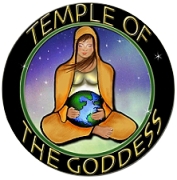

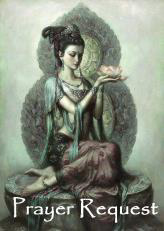
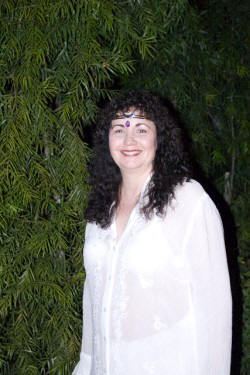 For almost two decades Rev. Xia has walked the path of the divine feminine, committed to her role as an inter-faith ambassador for the Pagan Community. Among her many articles, an essay entitled Paganism: Out of the Closet and into the Fire, originally written for her son’s school in Pasadena for a Diversity in Religion series, has been reprinted countless times. Additionally, she has written numerous mythological and ritual works centered around archetypal studies of the Goddess including Rites of Passage: A Goddess Ritual for Women, which aired on The Learning Channel–showing Pagan rites for Maiden, Mother, and Crone. She also produced and facilitated that segment for The Learning Channel. Additional articles include: Ritual and the Art of Alchemy, The Mythology of Nature, The Legacy of Creation Myths, The Myth of Matriarchy, and Secret Garden of the Feminine. She is completing a non-fiction book entitled, Feminine Alchemy: The Ritual Art of Cooking, a book of healing through Goddess archetypes which has been on the back burner for many years.
For almost two decades Rev. Xia has walked the path of the divine feminine, committed to her role as an inter-faith ambassador for the Pagan Community. Among her many articles, an essay entitled Paganism: Out of the Closet and into the Fire, originally written for her son’s school in Pasadena for a Diversity in Religion series, has been reprinted countless times. Additionally, she has written numerous mythological and ritual works centered around archetypal studies of the Goddess including Rites of Passage: A Goddess Ritual for Women, which aired on The Learning Channel–showing Pagan rites for Maiden, Mother, and Crone. She also produced and facilitated that segment for The Learning Channel. Additional articles include: Ritual and the Art of Alchemy, The Mythology of Nature, The Legacy of Creation Myths, The Myth of Matriarchy, and Secret Garden of the Feminine. She is completing a non-fiction book entitled, Feminine Alchemy: The Ritual Art of Cooking, a book of healing through Goddess archetypes which has been on the back burner for many years.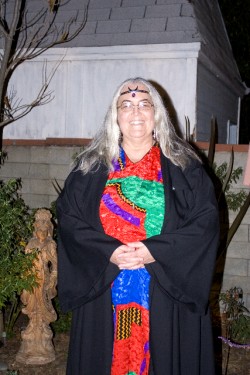 My specific Priestess Path I wish to dedicate myself to is sacred circles. This means that my truest spiritual ecstasy comes from ritual in community with others. This is a large circle that includes not only planning and performing ritual, but also creating ritual art such as building altars, teaching ritual, making video…
My specific Priestess Path I wish to dedicate myself to is sacred circles. This means that my truest spiritual ecstasy comes from ritual in community with others. This is a large circle that includes not only planning and performing ritual, but also creating ritual art such as building altars, teaching ritual, making video…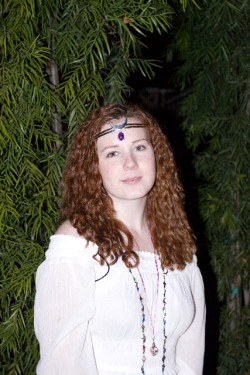 Marcella, our youngest priestess, has been a professional actor for many years. She is a graduate of the Los Angeles County High School for the Arts. Other training includes Viewpoints/Suzuki with Anthony Byrnes, Voice-Over Workshops with Sharon Mack, and the Royal Academy of Dramatic Arts in London, a Shakespeare Intensive. Her theater credits include The Cherry Orchard, A Midsummer Night’s Dream, and The Wizard of Oz. Her film credits include, Punch-Drunk Love, A Host of Trouble, and Kids in America. She has co-starred on various television shows, such as NCIS, Boston Legal, The O’Keefe’s, and Malcolm in the Middle. Awards encompass 1st Place in the 2005 and 2006 DTASC Shakespeare Competition / monologue, 1st Place 2005 RoleAbout / Cold Reading, 1st Place 2005 RoleAbout / Classical Monologue, and was the Silver Medalist ROP Outstanding Student in TV/Film.
Marcella, our youngest priestess, has been a professional actor for many years. She is a graduate of the Los Angeles County High School for the Arts. Other training includes Viewpoints/Suzuki with Anthony Byrnes, Voice-Over Workshops with Sharon Mack, and the Royal Academy of Dramatic Arts in London, a Shakespeare Intensive. Her theater credits include The Cherry Orchard, A Midsummer Night’s Dream, and The Wizard of Oz. Her film credits include, Punch-Drunk Love, A Host of Trouble, and Kids in America. She has co-starred on various television shows, such as NCIS, Boston Legal, The O’Keefe’s, and Malcolm in the Middle. Awards encompass 1st Place in the 2005 and 2006 DTASC Shakespeare Competition / monologue, 1st Place 2005 RoleAbout / Cold Reading, 1st Place 2005 RoleAbout / Classical Monologue, and was the Silver Medalist ROP Outstanding Student in TV/Film.
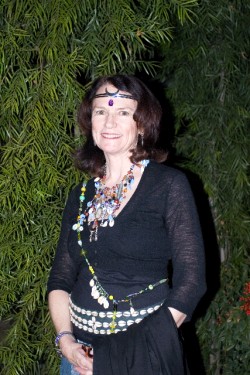 I have been following the path of the goddess for over 30 years. As an artist, I have always been interested in the mutual influence between the personal and political, private and communal, spiritual and artistic expression.
I have been following the path of the goddess for over 30 years. As an artist, I have always been interested in the mutual influence between the personal and political, private and communal, spiritual and artistic expression.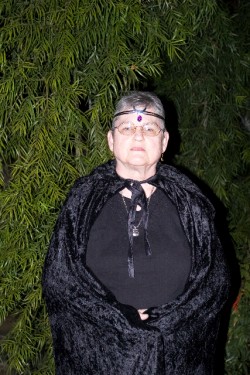 God was strictly male in the forties. And the males in my life were minor demi-gods to be obeyed without question. Father, priests, especially Monsignor, policemen, doctors–they protected me, taught me, molded me. My teachers (grade and high school) were Catholic nuns, but they were under the supervision and control of the priesthood.
God was strictly male in the forties. And the males in my life were minor demi-gods to be obeyed without question. Father, priests, especially Monsignor, policemen, doctors–they protected me, taught me, molded me. My teachers (grade and high school) were Catholic nuns, but they were under the supervision and control of the priesthood. Introduction—the beginning February, 1986
Introduction—the beginning February, 1986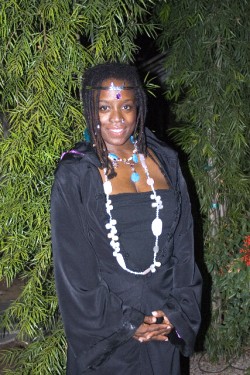 Haize Rosen has worked professionally as an actress, dancer and choreographer for 20 years. Haize is also an energy-light worker, certified in Thai massage and Hellerwork. To complement her work in the healing arts, Haize is a certified assistant mid-wife, and has a thriving doula practice. As a dancer, Haize has studied Balinese, The Orishas of both Africa and Brazil, and Classical Indian Dance in the style of Odissi. She has choreographed such renowned musicals as Guys and Dolls, Fiddler on the Roof, Little Shop of Horrors, and Grease. Haize recently wrote and starred in her one-woman shop, Country Colored Girl, which chronicled her family history in a small town in Alabama. She has studied ballet with Joy Finch, and acting at Lee Strausberg. Haize has worked rehabbing children at Juvenile Hall and taught theater and dance professionally in workshops throughout Los Angeles. The ordination onto her Priestess path in Temple of the Goddess is a culmination of her life’s work and provides an opportunity for Haize to apply her knowledge and skills in new and effective ways in the world.
Haize Rosen has worked professionally as an actress, dancer and choreographer for 20 years. Haize is also an energy-light worker, certified in Thai massage and Hellerwork. To complement her work in the healing arts, Haize is a certified assistant mid-wife, and has a thriving doula practice. As a dancer, Haize has studied Balinese, The Orishas of both Africa and Brazil, and Classical Indian Dance in the style of Odissi. She has choreographed such renowned musicals as Guys and Dolls, Fiddler on the Roof, Little Shop of Horrors, and Grease. Haize recently wrote and starred in her one-woman shop, Country Colored Girl, which chronicled her family history in a small town in Alabama. She has studied ballet with Joy Finch, and acting at Lee Strausberg. Haize has worked rehabbing children at Juvenile Hall and taught theater and dance professionally in workshops throughout Los Angeles. The ordination onto her Priestess path in Temple of the Goddess is a culmination of her life’s work and provides an opportunity for Haize to apply her knowledge and skills in new and effective ways in the world. 